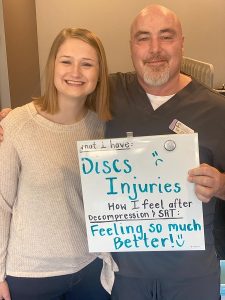 Herniated discs, also known as slipped or ruptured discs, occur when the soft center of a spinal disc pushes through a crack in the tougher exterior casing. These discs act as cushions between the vertebrae in your spine. When the soft material ruptures or bulges out, it can put pressure on the nearby nerves, resulting in pain, weakness, or numbness in an arm or leg.
Herniated discs, also known as slipped or ruptured discs, occur when the soft center of a spinal disc pushes through a crack in the tougher exterior casing. These discs act as cushions between the vertebrae in your spine. When the soft material ruptures or bulges out, it can put pressure on the nearby nerves, resulting in pain, weakness, or numbness in an arm or leg.
Symptoms of Herniated Discs
The symptoms of a herniated disc vary depending on the location and severity of the condition. Common symptoms include localized pain in the affected area, radiating pain down the arm or leg, numbness or tingling, and muscle weakness. In some cases, a herniated disc may cause no symptoms at all, making it essential to seek medical attention if you suspect you may have one.
Causes of Herniated Discs
Herniated discs can be caused by various factors, including age-related wear and tear, improper lifting, or traumatic injury. As we age, the discs in our spine lose some of their water content, making them less flexible and more prone to tearing or rupturing. Additionally, activities that involve repetitive or strenuous movements, such as heavy lifting or twisting, can increase the risk of a herniated disc.
Diagnosis and Treatment For Herniated Disc
Diagnosing a herniated disc typically involves a physical examination, a review of medical history, and imaging tests such as an MRI or CT scan. Once diagnosed, treatment options may include medication, physical therapy, or in more severe cases, surgery. At St. Paul Chiropractic and Natural Medicine, we specialize in providing non-invasive treatment options, such as spinal decompression therapy and chiropractic adjustments, to help alleviate pain and promote healing.
Chiropractic care is an effective and non-invasive treatment option for herniated discs. Through gentle spinal adjustments, chiropractors can help realign the spine, reduce pressure on the affected discs, and alleviate pain. Additionally, spinal decompression therapy can be beneficial in treating herniated discs by creating negative pressure in the discs, allowing them to retract and heal naturally over time.
Preventing Herniated Discs
While some risk factors for herniated discs, such as age and genetics, cannot be avoided, there are steps you can take to reduce your risk. Maintaining a healthy weight, practicing proper lifting techniques, and incorporating regular exercise into your routine can help keep your spine healthy and resilient. Additionally, avoiding prolonged sitting or standing and using proper ergonomics at work can also help prevent herniated discs.
If you are experiencing symptoms of a herniated disc, don’t wait until it gets worse. Schedule a consultation with us at St. Paul Chiropractic and Natural Medicine today and let us help you find relief from your pain and discomfort. Our experienced chiropractors will work with you to develop a personalized treatment plan tailored to your individual needs, so you can get back to living your life to the fullest.




